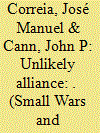| Srl | Item |
| 1 |
ID:
151513


|
|
|
|
|
| Summary/Abstract |
Structural adjustment policies (SAPs) facilitate the hollowing out of the traditional roles performed by states. As a consequence, private entities (some perverse) offer services the state is incapable of or unwilling to provide. Beginning in the 1980s, SAPs plunged neighbourhoods in Latin America and the Caribbean into socioeconomic, and political disorder. This paper assesses the relationship between neoliberal reforms to the Jamaican state and the metamorphosis of violence since the mid-1980s. Neoliberalism transformed violence in Jamaica by increasing inter-gang conflicts, shootings and gang-related murders in Kingston’s garrisons. It also transformed political enforcers into community dons who use violence as a tool for business transactions in the international drug trade, and as a method of gaining local respect and authority.
|
|
|
|
|
|
|
|
|
|
|
|
|
|
|
|
| 2 |
ID:
152026


|
|
|
|
|
| Summary/Abstract |
The war that Portugal was obliged to fight in Africa began in 1961 and immediately stretched the resources of its armed forces. Nowhere was this thinness more apparent than in policing the vast territory of Angola. The east and southeast of Angola were particularly vulnerable, as the area was a vast, sparsely populated region characterised by enormous featureless plains or chanas covered in tall grass and broken by an extensive river system and mountainous forests. The only military solution to policing these immense spaces was aviation and specifically the helicopter that could carry troops into battle, protect them with a gunship and bring them home when the operation was concluded. The immediate problem for the Portuguese Air Force (Força Aérea Portuguesa or FAP) in Angola and elsewhere was a scarcity of helicopters. The solution was an alliance with South Africa, which had a strong inventory of Alouette IIIs, to help in policing the east. This move was likewise in the interest of South Africa, as its threat came from Zambia through south-eastern Angola. This article examines the strategic and tactical development of this unusual, cross-cultural alliance and the symbiotic relationship that resulted in destruction of the enemies of both in Angola.
|
|
|
|
|
|
|
|
|
|
|
|
|
|
|
|